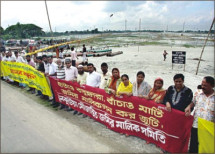The Politics of Transnational Agrarian Movements
Transnational Agrarian Movements (TAMs) have emerged in the last decade, resisting and contesting unfair land policies; but how do they differ from region to region, and how do their ideological, political and institutional differences affect their relationship to international development agencies?

Authors
The transnational agrarian movements (TAMs) which have emerged in recent decades have been actively engaged in the politics and policies of international (rural) development. Intergovernmental and non-governmental development agencies have welcomed and supported TAMs in the context of promoting international ‘partnerships for development’. The analysis in this article revolves around the politics of TAM representation, intermediation and mobilization around the issue of land. It focuses on La Via Campesina in relation to three other coalitions: the International Federation of Agricultural Producers, IPC for Food Sovereignty and International Land Coalition. It is argued here that ‘people linked to the land’ are socially differentiated and thus have varied experiences of neoliberal globalization. Their social movements and organizations are just as differentiated, ideologically, politically and institutionally. This differentiation is internalized within and between TAMs, and partly shapes TAMs’ political agendas and strategies in their interaction with international development institutions.
